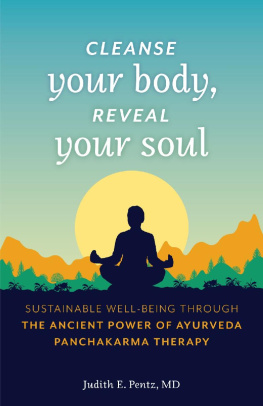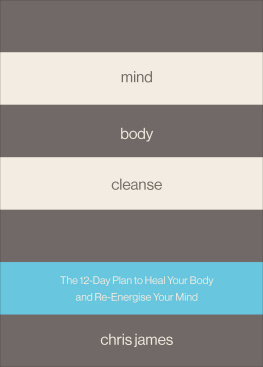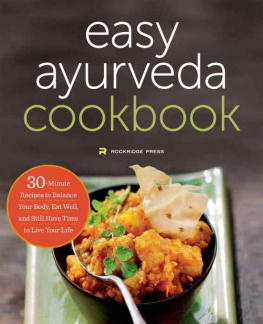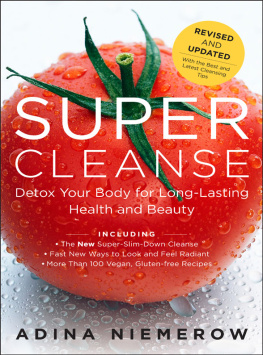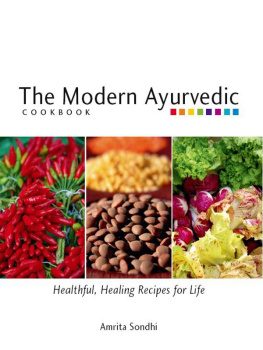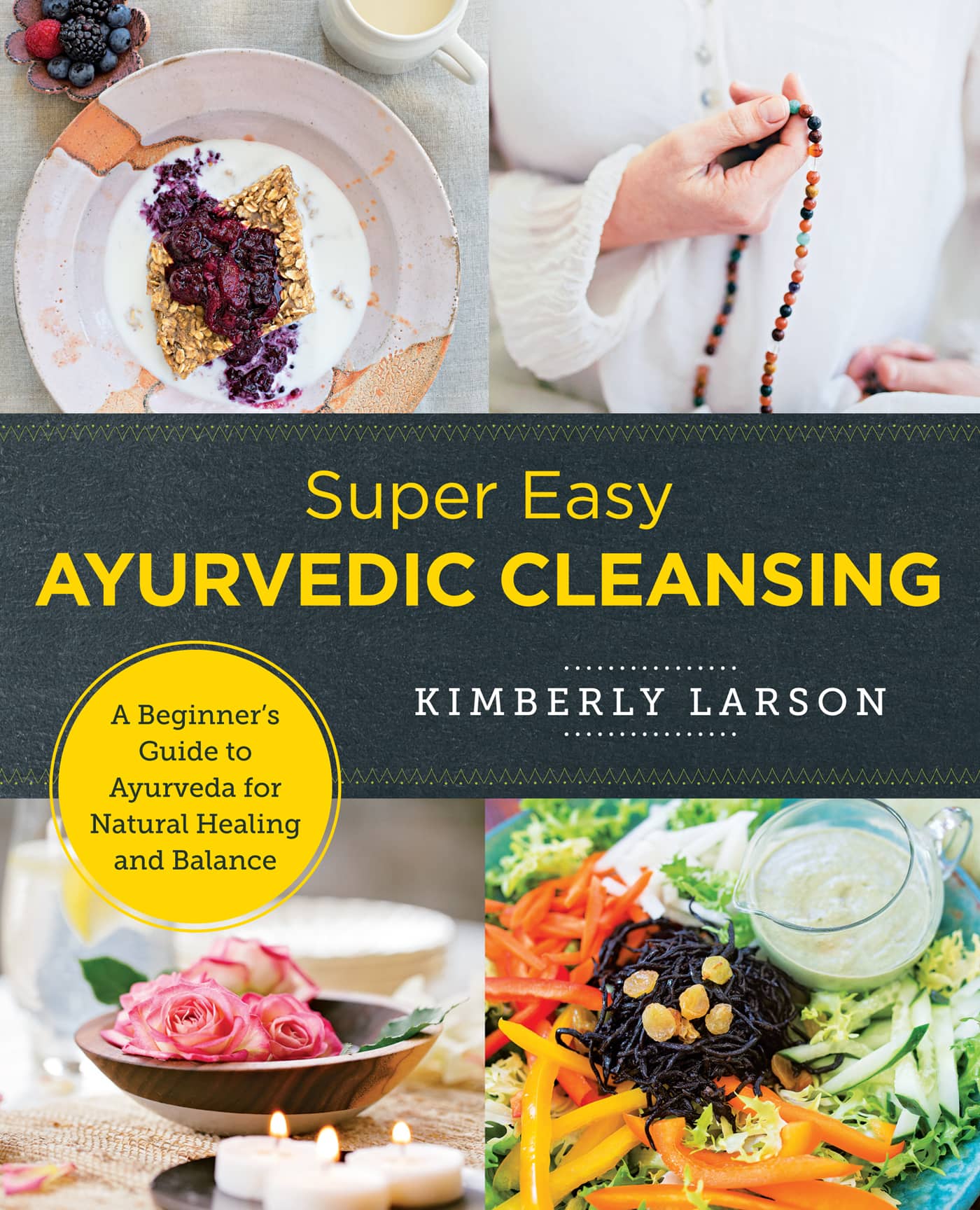Contents
Page List
Guide
Cover
Super Easy
AYURVEDIC
CLEANSING
KIMBERLY LARSON
A Beginners Guide to Ayurveda for Natural Healing and Balance

Contents
Taking It Deeper:
Traditional Ayurvedic Cleansing
Foreword
Public health is the science and art of supporting the health and quality of life in a community. Though methods vary greatly among cultures, in general, public health practices aim to reach community members in a meaningful wayso that we as individuals change our behavior for the better. When we change, our communities change. When our communities change, our countries change. When our countries change, our world changes. Big change, as we so often hear, does indeed begin with each one of us. One of the most creative ways to reach individuals through public health is one I came across when I first studied health in India in 1988.

In India, if you are a very observant Hindu, you celebrate more religious holidays than there are days in a year. Every single day has particular significance according to its position in the lunar calendar. Celebrations of each day range from modest affairs with minimal rituals to elaborate celebrations in which millions of people participate. An individuals reason to celebrate might be to nourish ones relationship to spiritual practices, to maintain religious protocol, or simply to not irritate family or community sensibilities. But there are also positive large, public health scale, side effects of each individuals participation. Why? Dietary restrictions or observances often accompany holidaystypically in the form of a fast. For example, during a one-day holiday, a celebrant is enjoined to fast until the eveningand then break the fast only with certain simple foods. Giving the digestive system a mini break in this way provides a small, gentle cleanse. In addition to these shorter fasts and festivals, some festivals are held during seasonal transitions and require more lengthy fasts. During the nine-day holiday of Navaratri, for example, celebrants fast on either liquids or only certain easily-digestible foods. This holiday occurs multiple times a year, but the autumn and spring Navaratris are the most widely observed.
Because the benefits of occasional fasting, especially during seasonal transitions, has been well known to Ayurveda in India for millennia, it is widely believed that the dietary and lifestyle observances that accompany holidaysespecially ones that occur during seasonal transitionswere consciously instituted to support public health. If people fast or simplify their diet during the changes of seasontimes when disease is more apt to be initiatedit allows the body and mind to gently cleanse and better adapt to the rhythms and realities of the new season. Tying these measures to religious holidays helped ensure that the populationwhether educated about good health practices or notwould be obliged to adopt them and therefore potentially remain healthier. Although these practices may not be as strictly or widely practiced now, many Hindus still observe them. One recent example is that of Indias Prime Minister Narendra Modi, who has, for decades, famously fasted on only liquids during Navaratrieven when it coincided with his maiden trip to the United States in the Fall of 2014, when he was sixty-four years old.
Though we in the West may not share the religion that initiated such fasts, we can still reap the benefits to mental, emotional, and spiritual health that these practices generate. Taking time to cleanse in a safe and gentle way, simplifying not only our diets but also fasting from the stimulation and demands of our daily responsibilities, allowing our attention to be stilledor at least grow more still for a brief interludecan refresh our energy, perspective, and relationship to life.
As individuals, we have the opportunity to educate ourselves about the wisdom of such practices and adopt them ourselves. This book can serve as a guide on how to calm and focus our attention, listen to and understand our bodies, simplify our diets, adopt gentle cleansing techniques, and internalize the value of doing so. Through these practices, our health can improve. Because our health also affects our families and our communities, we do change the world by changing ourselves.
So, happy holidays... whatever time of year you choose to celebrate good mental, spiritual, and physical health.
in love,
dr. claudia welch
doctor of oriental medicine
Introduction
Health is a state of being that includes our physical, mental, and emotional selves. We can have good health in which the body feels strong and vibrant, the mind is calm, and the emotions are stable and positive, or we can have poor health in which all components of our being show signs of imbalance. Making a choice about your personal state of being can feel overwhelming, because the amount of information about health, diet, and lifestyle choices available to anyone with technology-savvy fingertips can be mind-boggling and conflicting. Until I was introduced to the holistic system of medicine known as Ayurveda, I felt like I was randomly grasping at straws to choose which practices I should incorporate for my own health. But once I understood the intuitive, personalized Ayurvedic system, I could see that each diet, lifestyle, or cleanse out there is healthy for someone.
.
Cleansing is one practice that is often used to create better healthsome people cleanse to lose weight, while others cleanse to improve the removal of byproducts from cellular metabolism, accumulations from poor diet, toxins in their food or environment, or qualities increased during each season of the year. However, this process intended to create better health can sometimes do the opposite.
I recall my first cleanse, during which I drank only water for five days. A stranger told me how wonderful he felt after doing it, so I decided to try it. I did not have a framework to help me decide whether this would be a good idea for me; it definitely was not, and now, with knowledge of Ayurveda, I can see why. I was already thin and light in frame; it was a cooler than average autumn and I ended up chilled to the bone, ungrounded, and anxious from the lightening effects of the cleanse. This is an example of how practices meant to create better health can do the opposite if they are not chosen specifically for a person. The Ayurvedic framework can provide this personalized understanding.
After a decade as an Ayurvedic practitioner, I believe that people must address two factors before undertaking any cleanse. The first is to understand which diet will support health for you in your typical, everyday life and to use that knowledge to prepare food to nourish yourself. This baseline diet of personalized, healthful eating is important, because each one of us is different and therefore has different needs. We must meet those needs before we can prepare to undertake a cleanse. The second factor is to understand which type of cleanse is right for you, given your current state of health. The Ayurvedic principles explained in this book will provide the information needed to make knowledgeable decisions.


